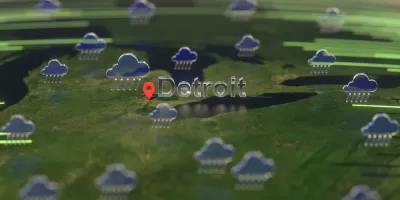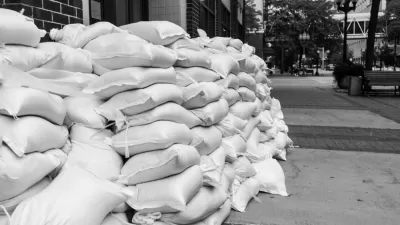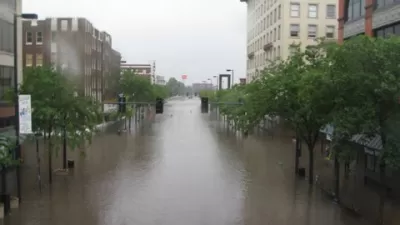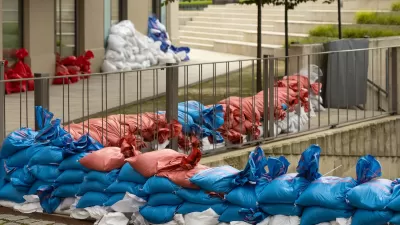While projections say areas of the U.S. Midwest around the Great Lakes will become more hospitable as the climate changes, stormwater and flooding is still a challenge in a surprising number of locations.

Ben Adler writes on the surprising impacts of climate change and extreme weather in the U.S. Midwest—where the summer has been marked by repeated flooding events in cities like Detroit.
The Detroit suburb of Gross Pointe Park is where Adler starts this story, in fact, at the home of Colin Moulder-McComb, which has been flooding regularly enough to drive Moulder-McComb from the area—a perhaps unexpected manifestation of a climate refugee.
For Moulder-McComb, the flooding that once seemed like an anomaly is now a regularity, writes Adler:
While the climate in the Midwest has always been relatively wet, the frequency and severity of downpours has gotten notably worse in recent decades, due to climate change. Warmer temperatures have led to more evaporation and precipitation. Between 1951 and 2017, the Great Lakes region’s average temperature increased 2.3 degrees Fahrenheit, its annual rainfall has risen 17% and it has 35% more heavy rain events, according to a study by Great Lakes Integrated Sciences and Assessments, a collaboration between the University of Michigan and Michigan State University, supported by the National Oceanic and Atmospheric Administration.
And the city of Detroit is suffering terrible effects from the change in the weather: "Between 2012 and 2020, 43 percent of homes in Detroit suffered flooding from rain, according to a recent survey of residents. Conditions like deteriorating roofs and cracks in basement walls made flooding more likely, and African American neighborhoods were more likely to flood than white areas."
Both Adler and Moulder-McComb acknowledge that it's hard to escape the effects of climate change anywhere in the country. But for a region with several advantages in the climate of the world to come—an abundance of fresh water being one of those advantages—it's frightening to see a lack refuge.
FULL STORY: How Midwesterners are handling constant flooding caused by climate change

Study: Maui’s Plan to Convert Vacation Rentals to Long-Term Housing Could Cause Nearly $1 Billion Economic Loss
The plan would reduce visitor accommodation by 25,% resulting in 1,900 jobs lost.

North Texas Transit Leaders Tout Benefits of TOD for Growing Region
At a summit focused on transit-oriented development, policymakers discussed how North Texas’ expanded light rail system can serve as a tool for economic growth.

Using Old Oil and Gas Wells for Green Energy Storage
Penn State researchers have found that repurposing abandoned oil and gas wells for geothermal-assisted compressed-air energy storage can boost efficiency, reduce environmental risks, and support clean energy and job transitions.

Opinion: DC Encampment Sweeps Hide, but Don’t Solve, Homelessness
President Trump recently ordered the clearing of encampments built by unhoused people on federal land in Washington, D.C.

Santa Barbara Could Build Housing on County Land
County supervisors moved forward a proposal to build workforce housing on two county-owned parcels.

San Mateo Formally Opposes Freeway Project
The city council will send a letter to Caltrans urging the agency to reconsider a plan to expand the 101 through the city of San Mateo.
Urban Design for Planners 1: Software Tools
This six-course series explores essential urban design concepts using open source software and equips planners with the tools they need to participate fully in the urban design process.
Planning for Universal Design
Learn the tools for implementing Universal Design in planning regulations.
Ascent Environmental
Borough of Carlisle
Institute for Housing and Urban Development Studies (IHS)
City of Grandview
Harvard GSD Executive Education
Toledo-Lucas County Plan Commissions
Salt Lake City
NYU Wagner Graduate School of Public Service





























